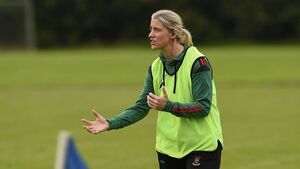The era of female GAA managers is fast arriving

Ballina Stephenites selector Cora Staunton giving instructions from the sideline. Picture: Conor McKeown
It must be all of sixty years ago that the first cracks appeared in that great bastion of male Irish hegemony - no, not the Catholic church - the Gaelic Athletic Association. It was then the liberated women of Ireland began the heave to oust the men who ran the show.
Well, not really, but they did begin to take on roles that were, up to sixty years ago, the preserve of the male of the species. Roles such as Rúnaí or Císteóir (nowadays called Secretary or Treasurer, as the Association continues to lose its commitment to the Gaelic language) were the first steps on the ladder.
The implicit role as washerwoman was laid aside. If it wasn’t for the women working quietly in the background, there’s many a club and county team that would have brought discredit on the Association because of the tawdry state of the jerseys. And, as a help to their cause, the laundrette began to make an appearance, even in rural Ireland.
We’ve all seen the black and white photos of the club team jerseys pulsating on the clothes line in the stiff breeze of an Achill - or any west of Ireland seaboard - day. The photos were a testament to the willing women workers who were the unrecognised, unsung heroes of their time. Real GAA people, out of the limelight, but playing their part, just as the corner forward or the number nineteen played their part on the pitch.
If memory serves me correctly and here, I must admit, that my memory is not what it used to be, Donegal led the way in leading the women out of the GAA’s dark ages by appointing a member of the fairer sex as a Rúnaí Choisde Condae (County Board Secretary). Again, if I recall correctly, it was headline news at the time and we are talking of a time in media when headlines were hard to make, unlike today when headlines are a dime a dozen and hardly worth a dime.
These were real liberated women, unlike some of the cackling feminists of today. They were not chasing headlines, they were quietly chasing change, showing their male counterparts that they were capable of doing the GAA jobs just as capably and in many cases, far more capably, as the men. There are still roles that have remained elusive. It will be some time before we have a Jarlatha Burns as Uachtaráin Cumann Luthchleas Gael. The Central Council of the Association remains very much a male preserve.
It’s time for the Association to elect a few women delegates to the Árd Comhairle as the first step to a female Uachtaráin. The people of Ireland have shown that they are not averse to having a woman President representing the country. The GAA has a bit of catching-up to do. For the Association, it is, as Cllr Padraig Flynn once opined at a meeting of Mayo County Council, as the startled members and some officials gazed on in awe, “the inevitability of gradualness”. I can’t see it happening in my time, but I live in hope.
We now have woman doctors running on to GAA pitches to see to the needs of injured players, mostly at county level it goes without saying. We have women physios as a key part of any credible county team back-up. We have women analysts, we have women statisticians, we have women dieticians, we have women fitness gurus. We have women doing all the jobs (except one and I’ll come to that in due course) that men did in the past and do in the present. And here, I must digress for a moment and suggest to Jarlath Burns, now that Armagh are gone from the championship, he might establish a rules revision committee on the issue of backroom teams and, in particular, deal with the number allowed.
I have it on good authority (I’ll rephrase that, I have been advised by a person of good authority and sound judgement) that the Mayo backroom team this year amounted to a total of 23 persons, each with a prescribed job. Whatever happened to multi-tasking? If true, that is a ridiculous number. You don’t need telling that it is eight more than we are allowed to have on the field at any one time. I accept that a medic, a physio and a fitness expert should be part of a backroom team. But where’s the need for any more than that? It seems to me that input from 23 people can only create confusion and perhaps even the chaos that many analysts ascribe, stupidly, to Mayo’s approach on the field.
You don’t need to be told that Mayo are in something of an interregnum with the current management team having been somewhat ignominiously pushed aside. It seems Kevin McStay was asked to resign and, quite properly, declined. The County Board acted. Three and a bit years ago the County Board took their time in appointing a new manager to replace James Horan. They were harassed and harangued by supporters and media because of the tardiness of their decision. This time they were harangued because they lacked graciousness in dismissing McStay.
And so the hunt has commenced for a new manager. Paper, as we know, never refuses ink and smartphones never refuse a suggestion from a supporter with an opinion. There is no shortage of “candidates” as per the media and the smartphone aficionados. Take your pick. You can have anyone of Andy Moran, Austin O’Malley, Oisín McConville, James Horan or Tony McEntee and that’s just the opening list of candidates, none of whom have expressed any interest in the position. But then, they have not ruled themselves out. And how could they when they have not been asked.
And so to the one job that has so far been refused to the women of the GAA. That of team manager. Why not a woman? And why not Mayo GAA to take the first brave, bold step. My erstwhile sports reporting colleagues, not to mention the keyboard warriors, would probably be aghast at the prospect but, is it any dafter than the speculation already out there?
The liberated women of Ireland have, in Cora Staunton, a candidate with an impeccable CV. All-Ireland winning footballer (four times), eleven times an All Star, six times an All-Ireland Club winner with Carnacon. She has an unmatchable international experience having mastered the Aussie Rules game and become an icon of the game Down Under. She has succeeded as a professional footballer in a hostile environment. She has coached Galway camogie and county title winning Ballina Stephenites. She has spent a lifetime working at success and driving personal improvement. She has impressed as a commentator on the game.
She is articulate and has shown on her RTÉ outings that she can read the game and supply thoughtful insights on why things are going wrong and how problems might be rectified. From what I have seen, her grasp of detail is far ahead on her lazy co-commentators on the panel. Now I’m not suggesting that being incisive and insightful as a commentator is necessarily a requirement on a managerial CV but, looking at recent appointments, a stint on does no harm to a candidate’s prospects.
Nor am I suggesting that Cora Staunton should be the next Mayo manager(ess), though we could probably do worse. What I am suggesting is that the day when women might become managers is fast arriving and Cora Staunton’s talents and achievements to date are a good example of what the future woman manager should be aiming for.





